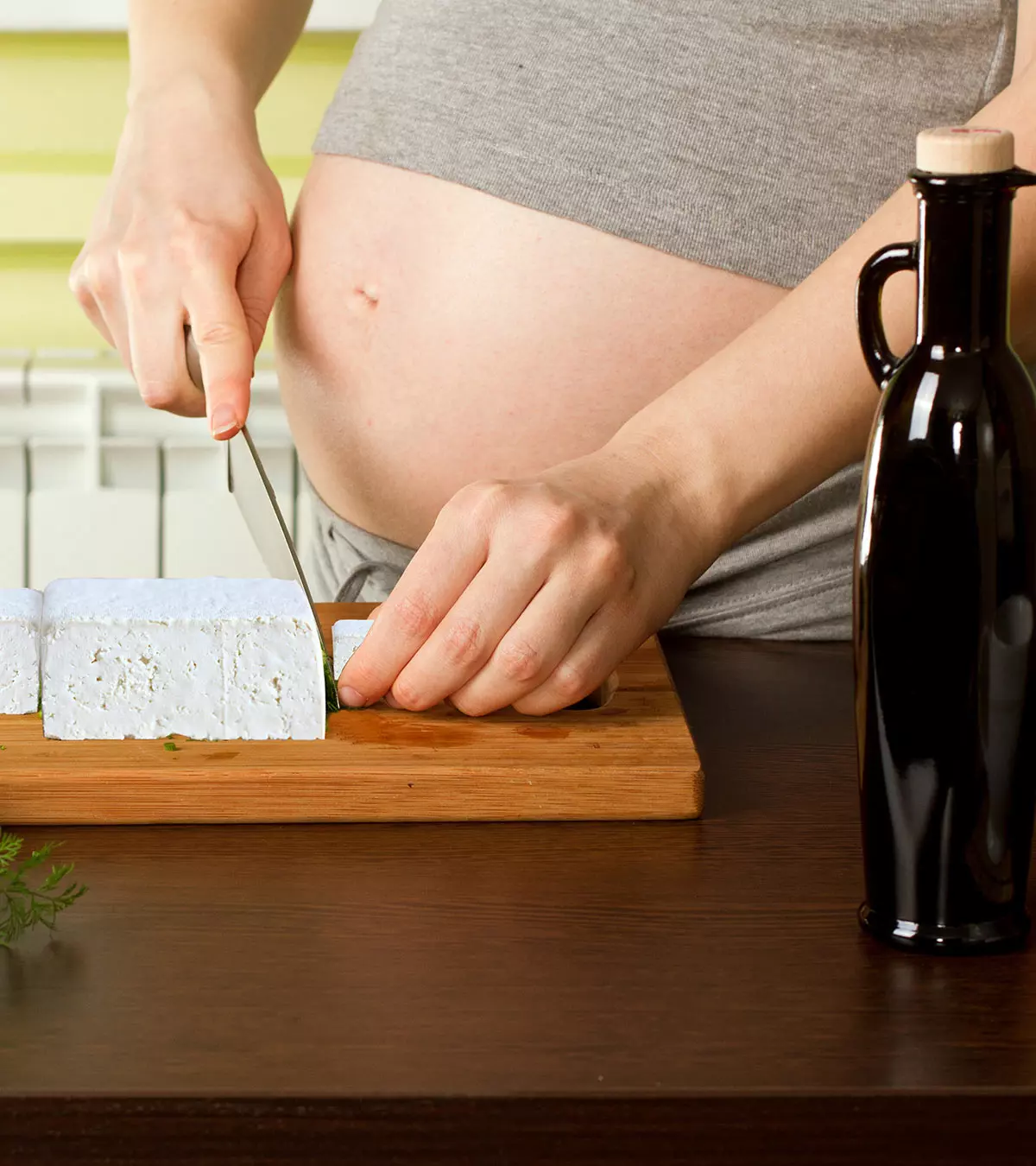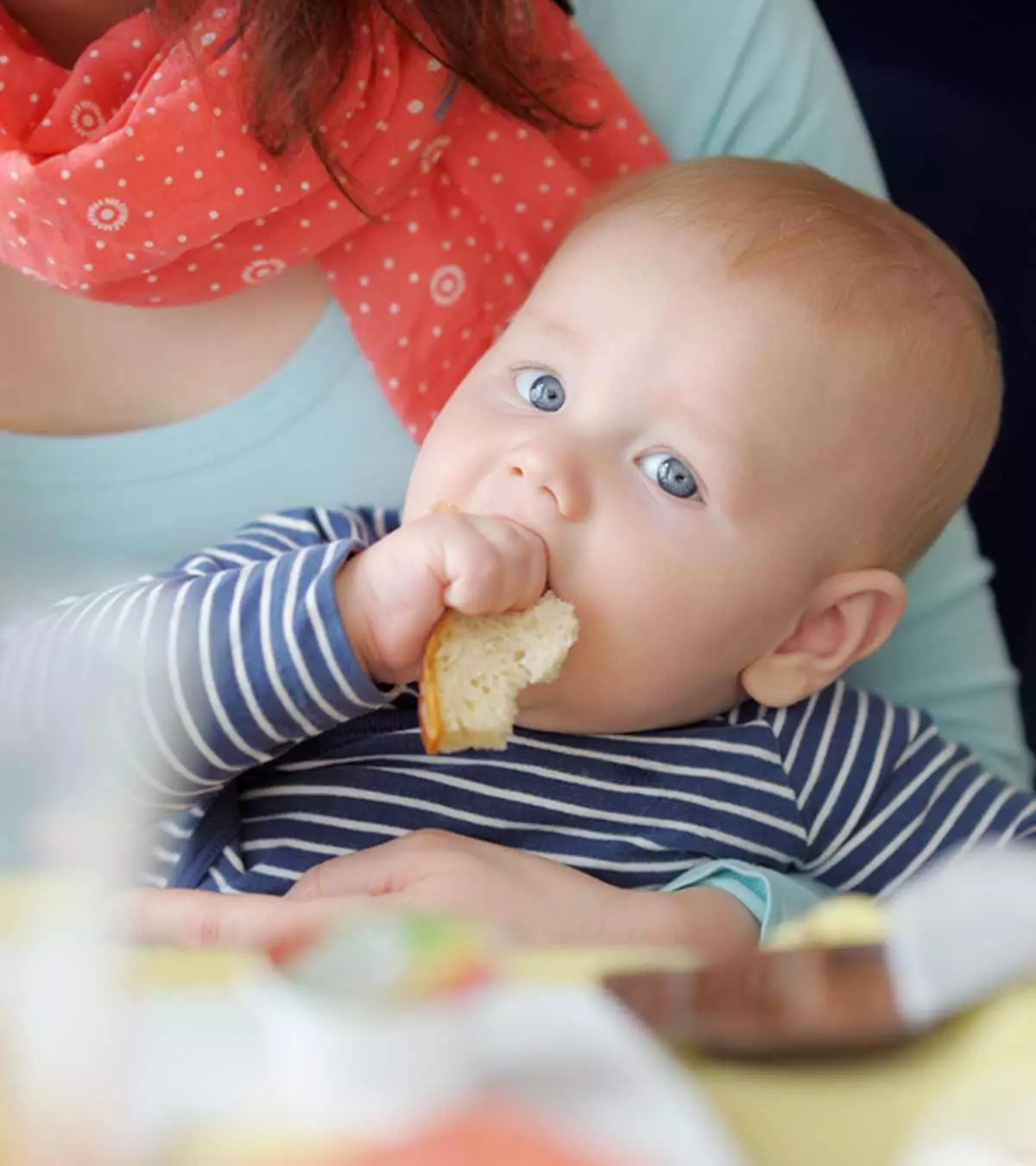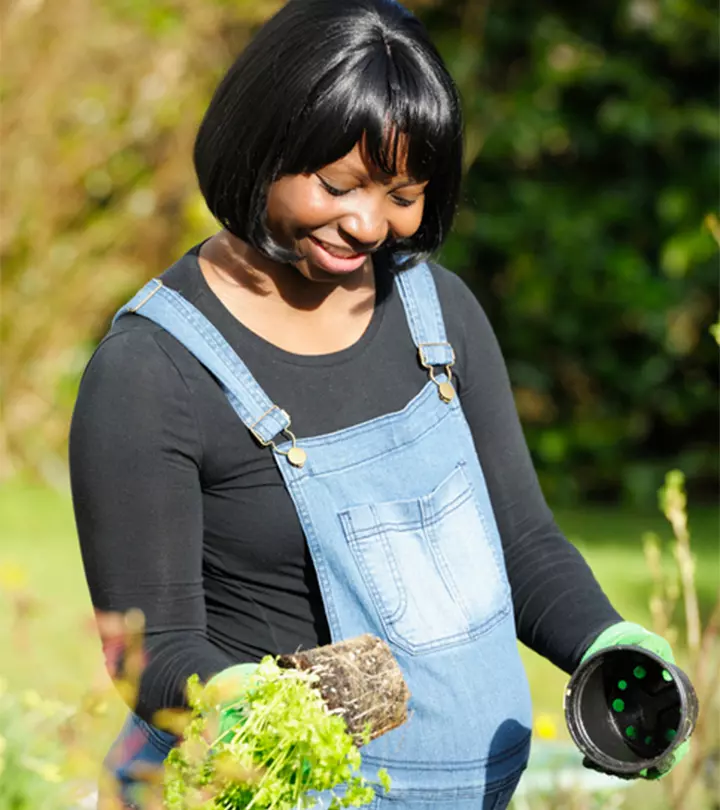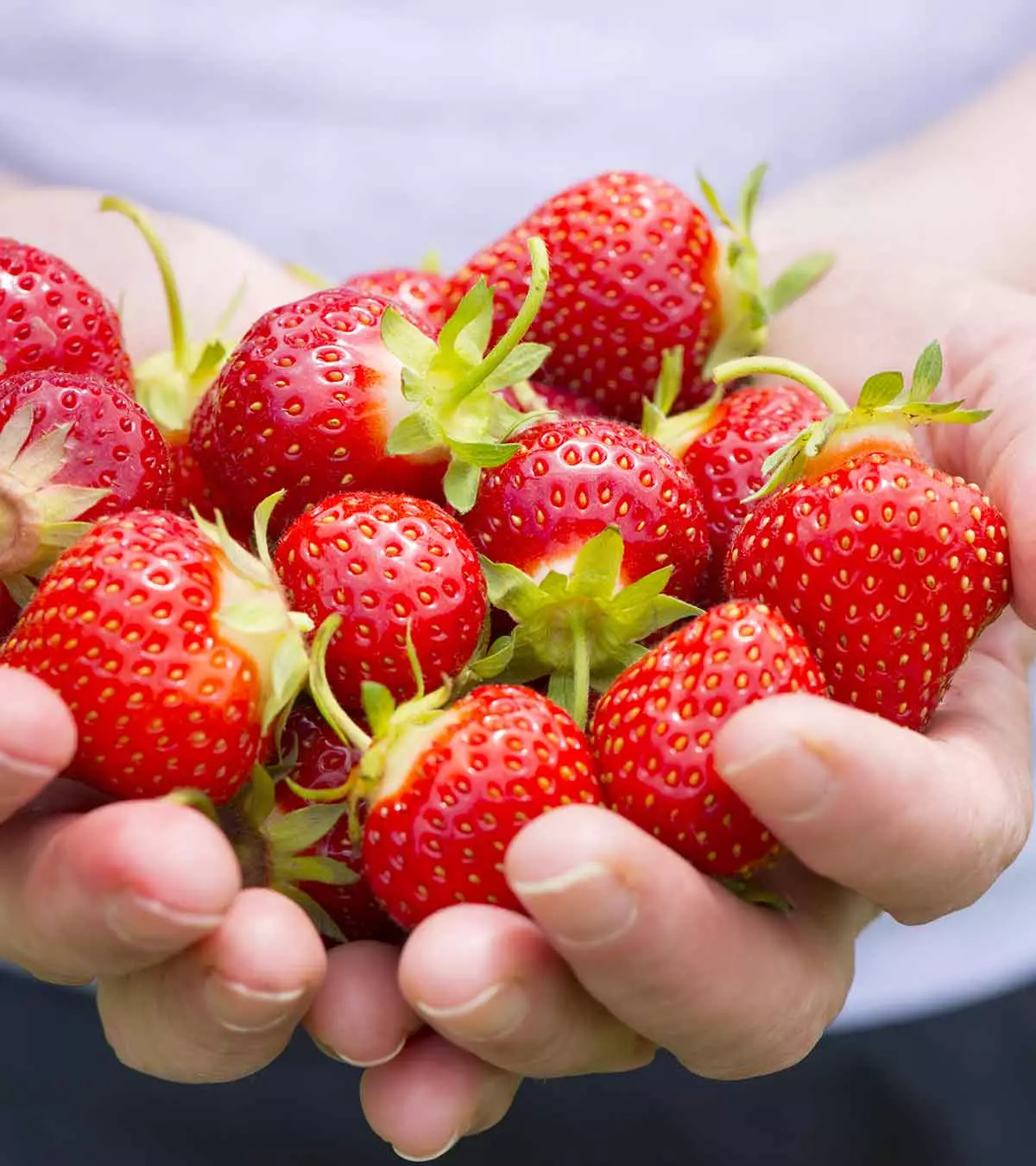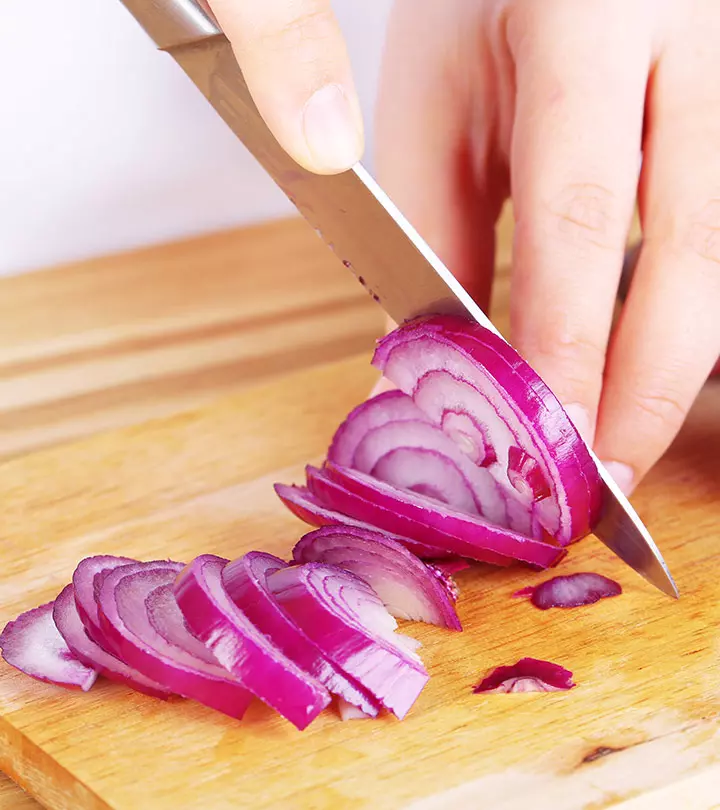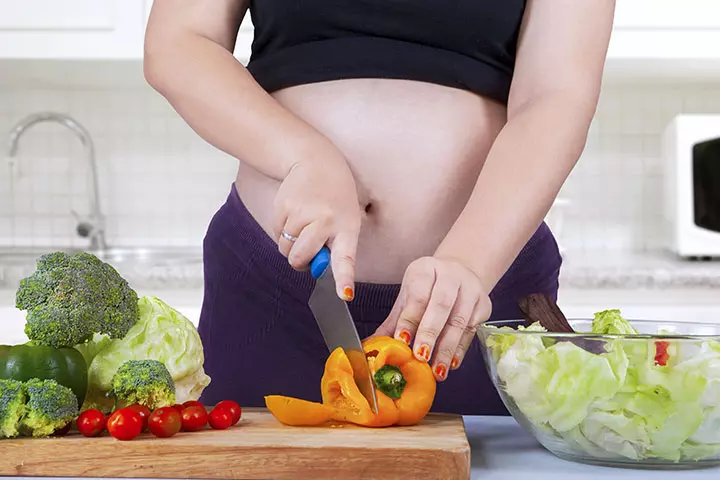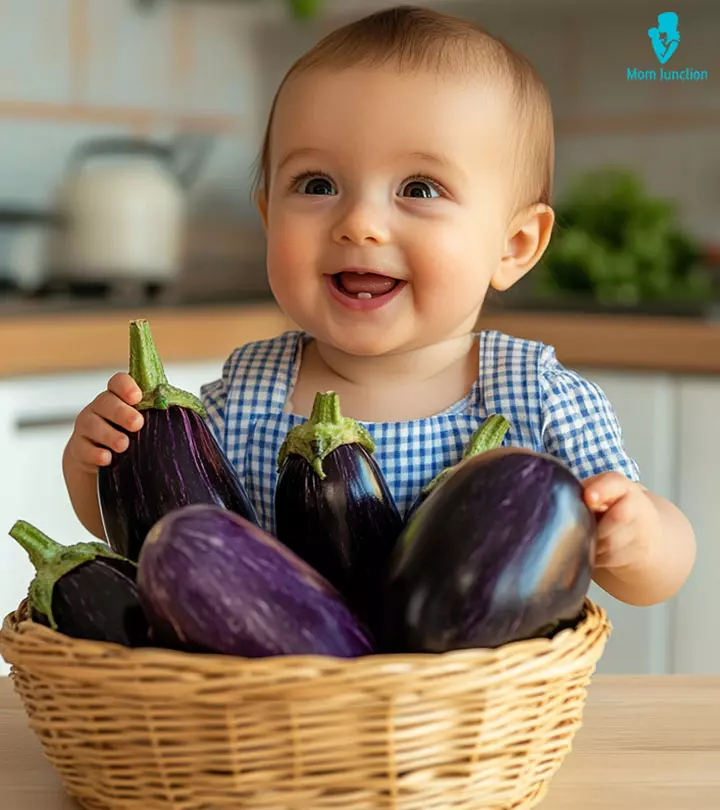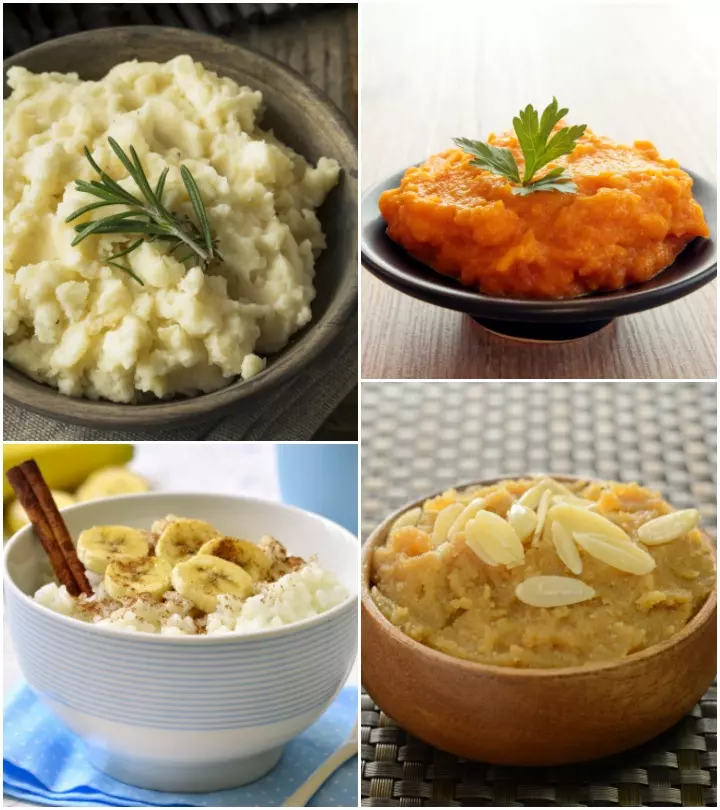
Image: MomJunction Design Team
Adequate infant nutrition is important for ensuring proper growth and development. Since breakfast is the first meal of the day, it should be nutritious and filling. Breakfast for infants typically offers a balanced diet, with a combination of the food groups, including carbohydrates, proteins, fats, vitamins, and minerals, and is important for nurturing a growing baby. Therefore, parents should ensure that the breakfast foods for babies are a perfect blend of nourishment and taste. Introducing fruits, vegetables, meats, grains, and millets can help you provide diverse tastes and nutrition to babies. However, coming up with new breakfast ideas every day may be challenging. Therefore, this post provides you with a list of healthy, wholesome, and easy-to-prepare breakfast recipes that your babies will enjoy. But, before that, let us understand the benefits of breakfast.

Key Pointers
- Blend potatoes, carrots, and peas with formula or expressed milk to make a delicious multi-vegetable puree.
- Try a highly nutritious puree with fruits such as mangoes, apples, and bananas mixed with water.
- To create a tasty porridge, cook rice flakes and bananas with water and milk.
- Cook rice with diced mangoes, water, and formula or expressed milk to make mango and rice porridge.
Why Is Breakfast Important?
Breakfast is crucial for babies for the same reason it is for adults. It provides calories for initiating the body’s metabolic processes (1). Even if your baby is fed in the middle of the night, his body would have surely depleted the resources by morning.
Data from the CDC National Center for Health Statistics (NCHS) indicates a decline in breakfast consumption among children and adolescents as they age. The percentage drops significantly from 95.8% for children aged 2 to 5 years to 72.9% for adolescents aged 12 to 19 (2). These findings emphasize the importance of establishing a regular breakfast routine and cultivating a positive attitude toward food in children from an early age.
 Quick fact
Quick factHow Much Should A Baby Eat For Breakfast?
The American Academy of Pediatrics (AAP) recommends around one-third of an adult portion or one tablespoon of each food for each year of your child’s age (3). However, babies exhibit different eating habits daily. For instance, they may eat four teaspoons of banana puree for three days in a row and then reject it altogether. On another day, they may prefer to eat only a single grape.
The role of the parent here is to remain responsive and offer the child a variety of foods covering all food types in different textures and tastes. The baby will decide how much to eat. Do not try to distract the child to make them eat more.
Learning some breakfast recipes will let you know what exactly you need to make in the morning.
16 Breakfast Recipes For Babies
These are some amazing breakfast ideas for your baby’s menu. Remember, breastmilk is the only food your baby must consume until the age of six months. Thereafter, you can introduce solid foods that can make great breakfast foods for babies. Many of these recipes use formula or breast milk. You can use expressed breast milk in the place of formula milk, or simply add water (as you will subsequently read in the recipes). All these breakfast recipes are for babies between six and 12 months of age. This is the age when the baby develops a taste for solid food. Therefore, these recipes can actually be baby-led weaning breakfast ideas.
1. Multi-vegetable puree
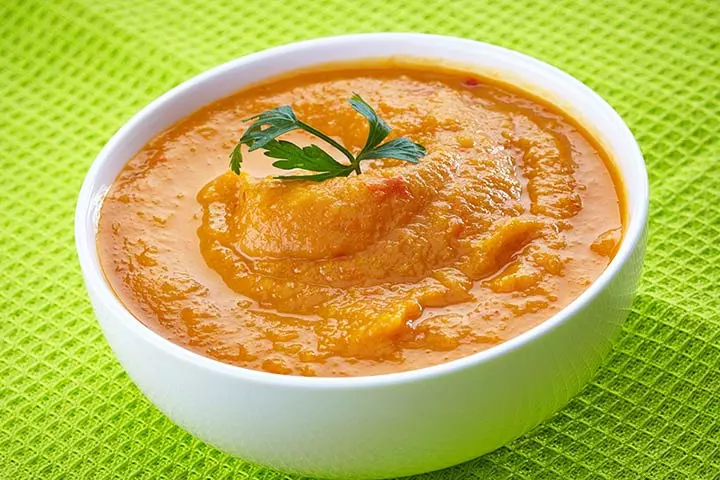
Vegetables can offer various essential nutrients for the baby’s proper growth and development, including potassium, folate, fiber, and vitamins (4). Therefore, this simple and classic breakfast for babies is quite popular as the first breakfast for the baby.
You will need:
- Vegetables of your choice such as potatoes, peas, carrots, etc.
- Water
How to:
- Start by choosing a mix of vegetables that you would normally give your baby. Cook the vegetables in a pressure cooker or steam or bake until they are soft and tender.
- Transfer the vegetable and the stock to a blender and blend them till they reach a thin consistency. Vegetable stock contains a lot of vital nutrients so never drain it away.
- Add some boiled water, breast milk or formula to further thin the consistency of the puree if required. Once done, let the mixture cool down and feed it to your little one.
2. Fruit puree
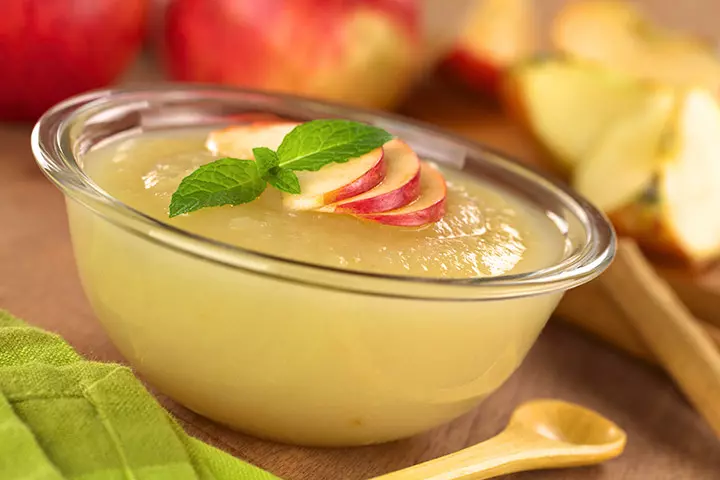
This is the fruit equivalent of the vegetable puree that has all the goodness of fresh fruits. Just as vegetables, fruits can also provide several essential nutrients to the baby for their proper growth and development (4).
You will need:
- Fruits of your choice such as apples, mangoes, bananas
- Water
How to:
- Fruit puree for babies is a healthy and nutritious breakfast choice. Start by peeling and pureeing the fruits of your choice. You can do this by putting the fruits in a blender.
- Add water to thin the mixture if required. Once done you can serve the puree as a breakfast food to your baby.
3. Banana and rice porridge
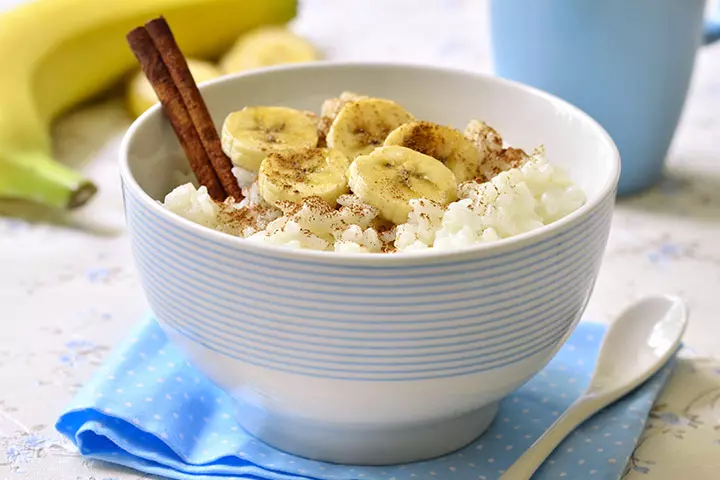
Porridge is healthy for adults but also makes an amazing breakfast for babies. A conventional porridge is made using milk, but since we are preparing it for babies, you can opt out of it or use formula or expressed milk instead.
We use rice here since, unlike wheat, it is gluten-free. Therefore, you need not worry about allergies. It is also easy to digest and contains lots of carbohydrates, and other nutrients. It is for this reason, rice flakes can make a great breakfast cereal for babies. According to experts, rice cereals are a great source of carbohydrates, which provide energy for growth and development. Moreover, they also provide other nutrients such as protein, minerals such as iron and calcium, and vitamins B and E (5). Similarly, bananas are easy-to-digest fruits, rich in fiber, vitamins, and minerals, essential for babies’ growth (6).
You will need:
- 1 cup rice or rice flakes
- 1 cup chopped banana
- 3 cups water
- 1 cup formula or expressed milk (optional)
How to:
- Start by cooking the rice or rice flakes by boiling them in a cooking pot till they are soft and mashy without any presence of solid grains.
- Once the rice is cooked, add some chopped bananas and formula or expressed milk (optional) in the same cooking pot and cook them together for two to three minutes. Keep stirring the mixture so that the banana and rice mix well. In case you would like to dilute the porridge, add some water and cook for an additional three to four minutes.
- Once done, let the porridge cool before feeding. This makes a highly nutritious breakfast for your baby.
4. Oatmeal Banana Porridge
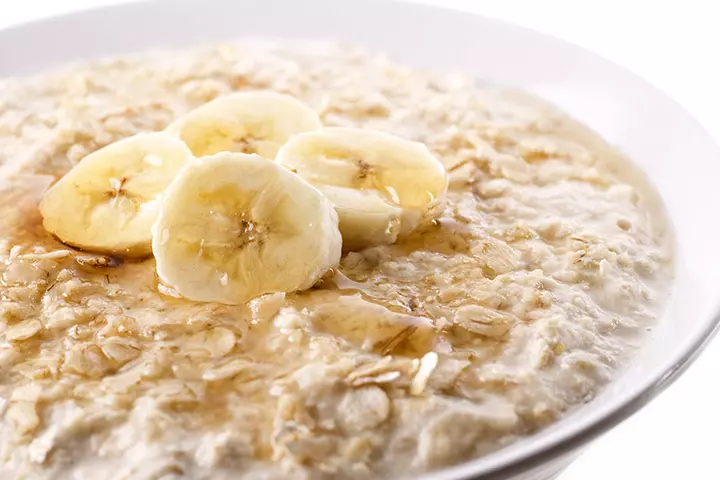
This is similar to the previous porridge recipe with the replacement of rice with oatmeal. Oatmeals are usually flat, but you can coarsely grind them again using a hand pounder or a blender with a blunt blade. This is to ensure that there are no fine bits of oats when the porridge is ready and that the oatmeal cooks thoroughly. The USDA data suggests that each cup or 100g of oats contains about 13.3g of protein, 66.7g of carbohydrates, and are also rich sources of macronutrients like potassium and calcium (7).
You will need:
- 2 cups ground oatmeal
- 1 cup chopped banana
- 3 cups of water
- 1 cup formula milk (optional)
How to:
- Add the ground oatmeal to the water and boil the mixture together. Cook the oats till they are absolutely soft and are easy to mash.
- Once the oats are cooked, add bananas and the optional formula milk to the cooking pot and cook the mixture for two to three minutes while stirring it all together. Add water and cook for an additional three to four minutes in case you need to dilute the porridge.
- Your oatmeal banana porridge is ready. Serve this healthy breakfast to your little one once it is cold enough to feed him.
5. Rice flour and vegetable porridge
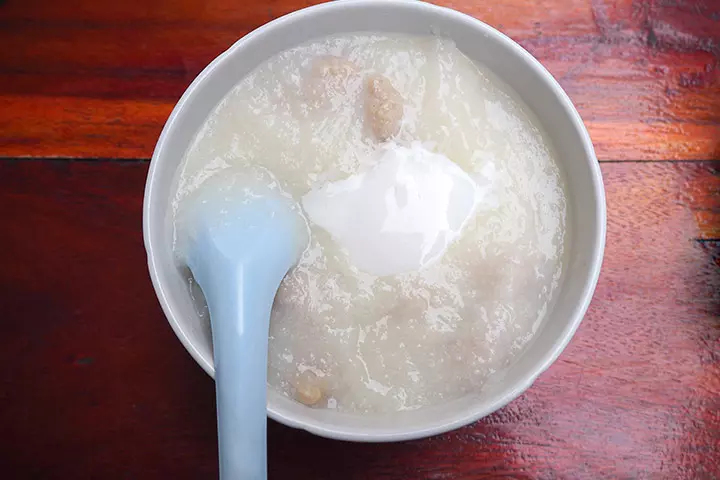
You can make porridge using rice flour instead of rice grains or rice flakes. Each cup of unenriched white rice flour can provide about 79.8g of carbohydrate, 6.94g of protein, 16µg of folate, and more (8). In this porridge recipe, you can use vegetables in place of fruits to give this healthy breakfast for babies a unique flavor.
You will need:
- 2 cups rice flour
- 1 cup chopped carrots and peas
- 3 cups water
How to:
- Mix the rice flour and water in a cooking pot. Cook the mixture for five to seven minutes, stirring continuously to prevent the formation of lumps. Keep cooking till the rice flour completely mixes with the water and becomes soft. Once you reach this stage simmer the flame and let the mix cook slowly.
- In a separate vessel boil some peas and carrots till they are soft. Once done, blend them together using the vegetable stock as thinner.
- Add this vegetable puree to the rice flour and water mixture. Continue boiling the mixture till they mix well. The porridge is done. Cool it well before feeding it to your baby.
6. Mango and rice porridge
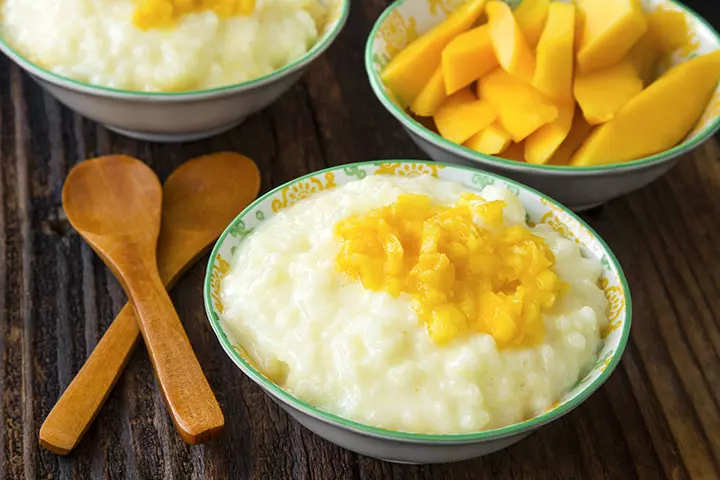
The natural sweetness of mango combined with the goodness of rice makes a healthy breakfast recipe for a baby. While rice provides enough carbohydrates for the baby, one cup of sliced mangoes offers 277mg of potassium, 60.1mg of vitamin C, 71µg of folate, and various other nutrients (9).
You will need:
- 1 cup sliced and diced mangoes
- 2 cups rice
- 3-4 cups of water
- 1 cup formula or expressed milk (optional)
How to:
- Start by boiling the rice and water together to cook the rice. While the rice is boiling, blend some mangoes into a puree.
- Once the rice water begins to boil, simmer the flame and let the rice cook for four to five minutes. Thereafter, add the mango puree and the optional formula or expressed milk to it. Cook them together for two to three minutes while stirring the mixture to make it homogenous.
- After completion, serve the porridge to your baby once it is cooled.
7. Barley apple porridge
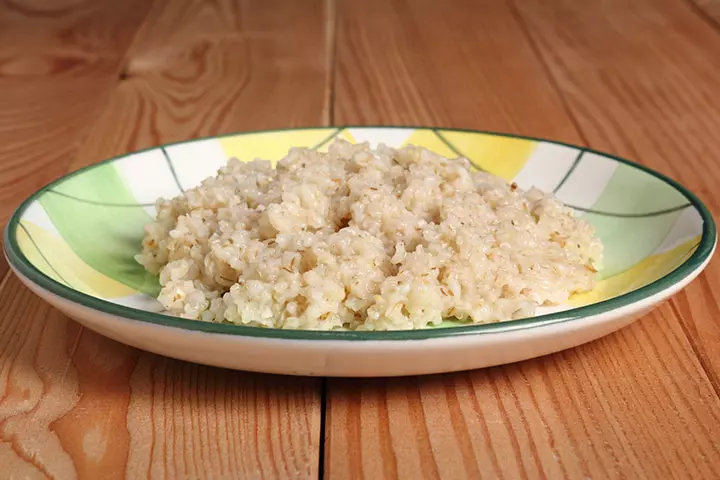
Barley makes a great food for babies, and you can use finely powdered barley flour to make some breakfast porridge for your baby. In fact, each cup or 100g of barley flour can provide your baby with 77.4g carbohydrate, 12.8g total dietary fiber, 8.72g protein, 36mg calcium, 88mg magnesium, 234g phosphorus, 367mg potassium, and more nutrients (10).
You will need:
- 1 cup barley flour
- 3 cups water
- 1 cup mashed apple
- 3tbsp formula or expressed milk (optional)
How to:
- Mix the barley flour with water and cook them together in a cooking pot for seven to ten minutes. Barley takes a longer time to cook than rice so make sure the barley is cooked properly. Keep stirring the mixture to prevent the formation of any lumps. Once the barley is cooked simmer the flame and let the mixture cook slowly on a low flame.
- Separately, cut an apple into small pieces and then mash it into smaller pieces.
- Add the mashed apple and the optional formula or expressed milk to the cooking pot and cook the mixture for five minutes. Stir and mix the porridge while cooking. Once done, let the porridge cool before serving it as a breakfast to your little one.
8. Lentil, carrot and pumpkin mash
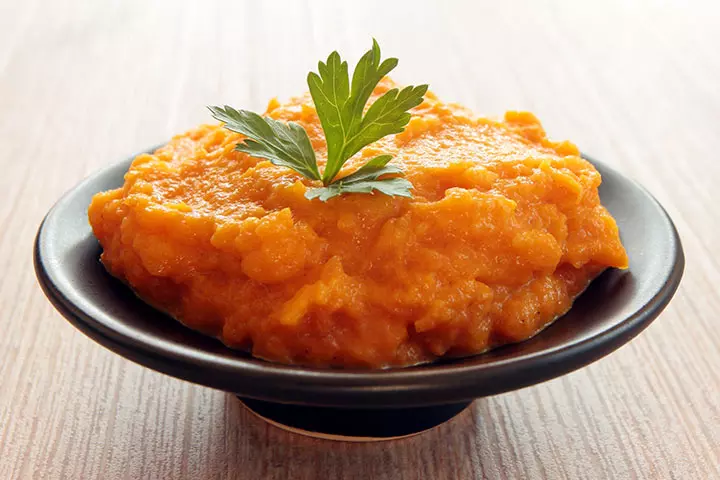
Lentils are a healthy food option for your baby and when combined with vegetables, like pumpkin and carrot, which have natural sweetness, the flavor profile as well as the nutritional value of the preparation increases. One cup of red lentils contains 45.9g of protein, 121g of carbohydrate, 20.7g of dietary fiber, 92.2mg of calcium, 14.2mg of iron, and many many other nutrients (11). While one cup of diced pumpkin adds calcium (24.4g), potassium (394mg), and Vitamin C (10.4mg) to the recipe, one cup of chopped carrots mainly contributes to its vitamin C (7.55mg) and vitamin A (1070µg) content (12) (13). Thus, this recipe makes an ideal choice for a healthy breakfast for babies.
You will need:
- Peeled and diced pumpkin
- Red lentils
- Diced carrot
- Water
How to:
- Boil the pumpkin and carrot together while cooking the lentils separately till they are completely soft.
- Once the vegetables are done, transfer them to a blender to blend them coarsely or mash them using a masher.
- Transfer the mashed vegetables into the cooked lentil vessel and cook them together for three to five minutes.
- Let the mash cool before serving it as a breakfast to your little one.
9. Mashed oatmeal and bananas
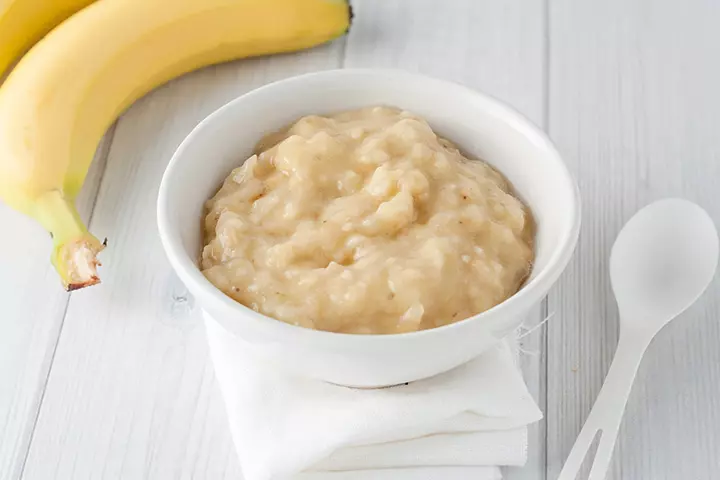
Both oatmeal and bananas are easily digestible foods and offer several nutrients to the baby. Thus, offering mashed oatmeal and bananas can give your baby an amazing start to the day.
You will need:
- 2 cups oatmeal
- 1 cup mashed bananas
- 2 cups water
- 1 cup formula or expressed milk (optional)
How to:
- Add the oatmeal to the water and cook for ten minutes on a low flame.
- Once the oats have become soft, add the mashed bananas and the optional formula or expressed milk to the mix and simmer for three minutes. Keep stirring the mix so that it cooks well.
- Let it cool and feed it to your baby.
Charity Curley Mathews, a mother of two and a blogger, shares tips on how to use bananas for baby food. She writes, “For beginners, add enough water so the puree easily pours off the spoon but know this: very ripe bananas are good for slowing things down in the diaper department. If your baby seems constipated, try an underripe banana (i).”
10. Meat-vegetable puree
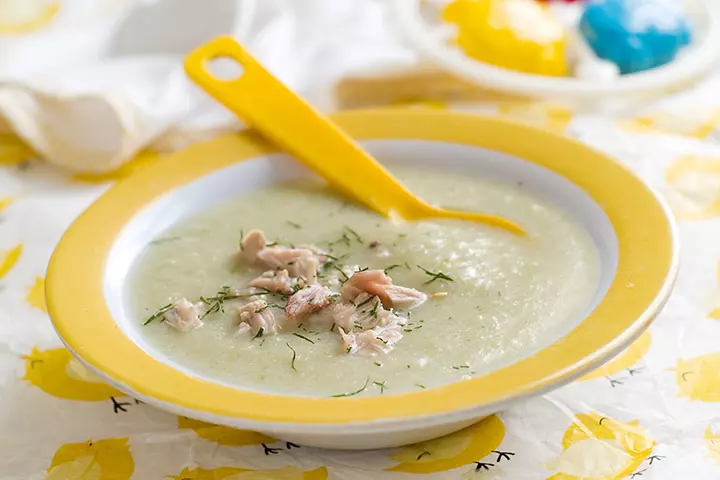
The age between eight and 12 months is the time when you will introduce your baby to foods such as meat and eggs. Meat is healthy and is mainly composed of nutrients such as high-value proteins, fats (omega-3 polyunsaturated fatty acids), zinc, iron, selenium, potassium, magnesium, sodium, vitamin A, B-complex vitamins, and folic acid (14). Thus, meat and vegetables together can make a great breakfast food for your baby. Depending on the choice of meat, whether cattle, poultry, fish, or egg, the nutritional value may differ.
You will need:
- 1 cup sliced vegetables of your choice such as peas, carrot, potatoes, etc.
- 1 cup boneless and minced meat
How to:
- Start by cooking the vegetables and blending them together once they are cooked. Do not drain the excess vegetable stock since you can use it during blending.
- The next step is to prepare some meat puree. For this, you need the boneless minced meat of your choice namely cattle, poultry, or fish. Cook the meat till it is soft and tender. Do not drain the meat stock since it can be used to make the meat puree.
- Once the meat is cooked, blend it into a fine puree. Thereafter, mix the meat puree to vegetable puree and give them a round of blending for a minute. Add some boiled water if you want to thin the consistency. Cool it well before you serve it to your baby.
11. Banana and apricot porridge
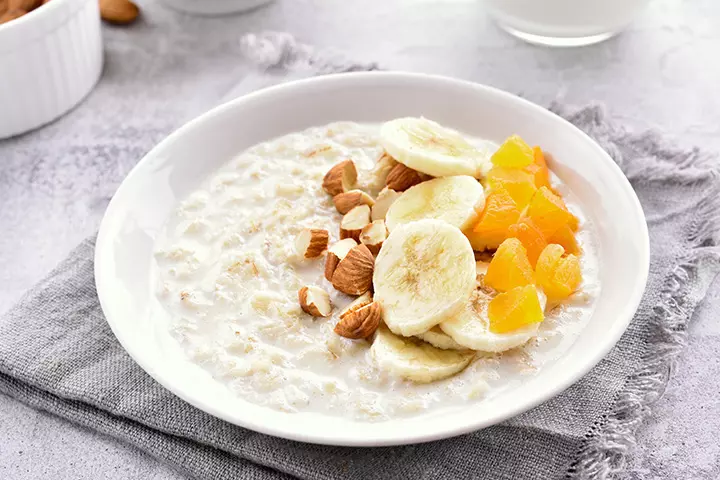
Apricots are packed with nutrition, with each cup of sliced apricots consisting of 18.3g carbohydrate, 21.4mg Calcium, 16.5mg Magnesium, 38mg Phosphorus, 427mg Potassium, and other nutrients (15). Additionally, the natural sweet taste of apricots makes it an excellent baby food. Combined with the delicious and nutritious banana, this porridge will make the little ones ask for more.
You will need:
- 1 cup oatmeal
- 1 banana
- ½ cup apricots, pitted and finely chopped
- 3 cups water
How to:
- Place apricots in a cup and soak in boiling water for 10-20 minutes.
- Cook oats in boiling water. The cooking time will depend on the variety of oats used.
- Combine cooked oats, bananas, and apricots in a blender until smooth.
- You may add milk (breast milk or formula) to adjust the thickness of the porridge.
12. Banana split pancakes
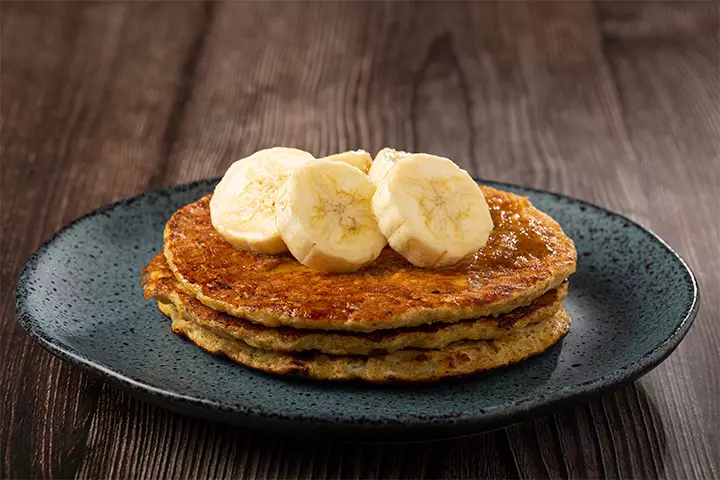
Pancake is one of the easiest dishes to make for your baby. This Banana Split Pancake will surely be a hit with your baby and the adults. Each 100g of all-purpose wheat flour mainly offers about 12g of protein, 74.6g of carbohydrate, and 23µg folate (16). You can substitute wheat flour with gluten-free oat flour if your baby is suffering from celiac disease or has gluten sensitivity.
You will need:
- 1 banana (overripe)
- 1 egg
- 1 cup wheat flour or oat flour
- Cinnamon (optional)
How to:
- Take the banana in a bowl and mash until smooth.
- Add egg, flour, and cinnamon and whisk until they are combined well. Do not over-whisk.
- Place a skillet over medium heat and pour the batter into small circles.
- Cook for three to four minutes on both sides. The pancake should be golden brown.
- You can serve the pancakes with nut butter or yogurt.
13. Blueberry muffin cereal
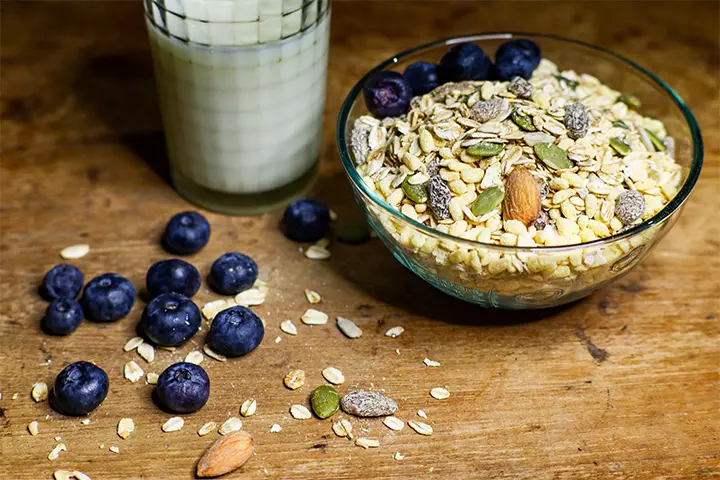
Blueberry muffin cereal is easily available in the market. However, you can make it at home easily. Each 100g of oat flour mainly consists of 13.2g of protein, 69.9g of carbohydrate, 10.5g of dietary fiber, and other nutrients (17). While each 100g of blueberries mainly contributes to the calcium (12mg), potassium (86mg), and Vitamin C (8.1mg) content (18). This way, it will be a more nutritious breakfast for your baby.
You will need:
- 1 cup oat flour
- ⅓ cup blueberries, chopped finely
- 1tbsp vanilla extract
- 2 cups milk
How to:
- Combine all the ingredients except milk well in a bowl. Do not over-whisk.
- Boil milk in a pan.
- Pour the mixture into the boiling milk in small quantities. Keep stirring to avoid lumps.
- Keep stirring until the mixture is cooked thoroughly.
- You can add more milk to adjust the texture of the porridge.
 Quick tip
Quick tip14. Boiled chicken chunks and mashed potatoes
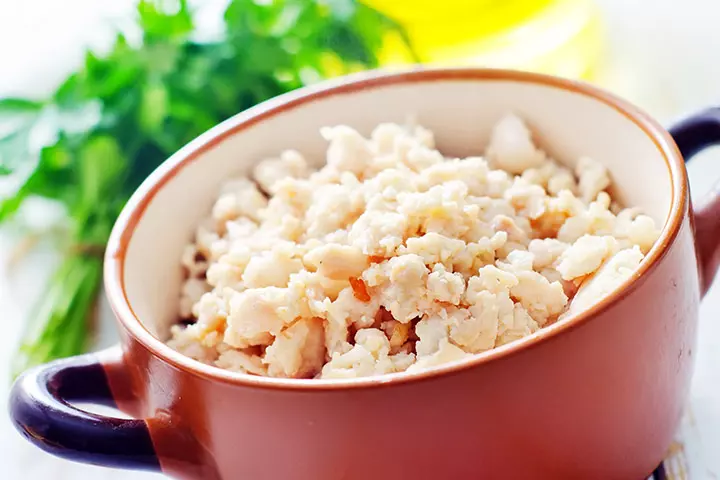
This is a recipe that makes breakfast finger food for the baby and is quite nutritious at the same time. You can give it to your little one once he is ten-months old by when he will be habituated to a variety of solid foods. While chicken can provide a wide variety of nutrients, including high-value protein, a cup of potatoes can offer carbohydrates (19.1g), potassium (179mg), calcium (6.52mg), and sodium (92.9g) (19).
You will need:
- 1 cup finely chopped and diced potatoes
- 1 cup boneless chicken minced into small chunks
How to:
- Chop the potatoes into finer pieces that are small enough for your baby to hold by his finger. The same applies to the chunks of boneless chicken meat.
- Cook the potatoes and chicken separately till each of them is soft and tender. In fact, they should be tender enough to be swallowed easily without the need of chewing.
- Once the potatoes and chicken are cooked, mix them together thoroughly. Add some chicken stock to soften the mixture. Once done, serve it to your baby. Let him have it with his own hands and see how he enjoys this delicious breakfast.
15. Berry smoothie
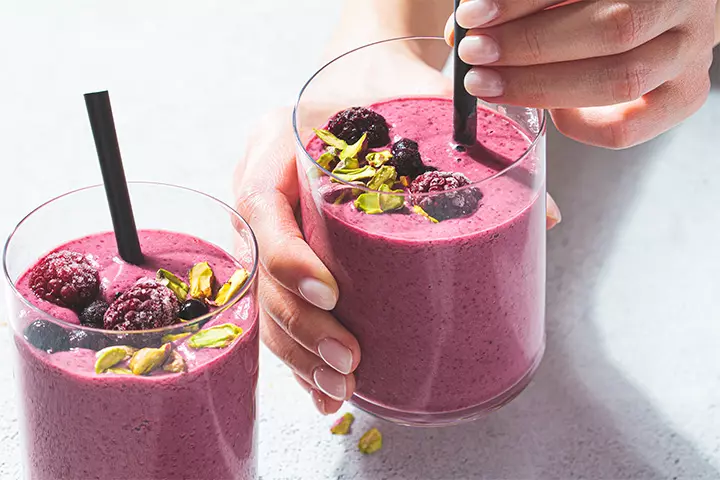
A mixed berry smoothie is one of the best ways to start the day. This berry smoothie is easy to make and packed with nutrition. Milk and bananas are known to be the sources of essential nutrients for the baby, like calcium and potassium. Similarly, mixed berries can add to the nutritional value of the smoothie as each cup of mixed berries offers calcium (24mg), potassium (207mg), magnesium (16.5mg), phosphorus (30mg), and vitamin C (66.3mg) (20).
You will need:
- 1 cup mixed berries
- 1 banana
- ½tsp vanilla extract
- Milk of choice (breast milk or formula)
How to:
- Place the ingredients in a blender and blend until smooth.
- Strain the smoothie and blend the rest of the contents until completely smooth.
- Adjust the thickness of the smoothie by adding milk.
16. Banana spinach pancakes
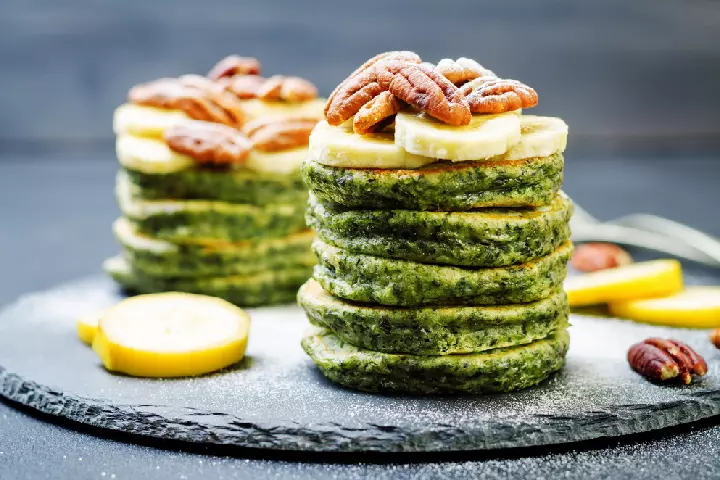
Start your baby’s day with a nutritious twist on traditional pancakes! These Green Banana Spinach Pancakes are not only visually appealing but also packed with essential nutrients. Even a small spinach leaf (10g) can contribute greatly to essential nutrients, like calcium, folate, potassium, and vitamins, required for the baby’s growth (21).
You will need:
- 120g whole-wheat flour
- 1 egg
- 1 ripe banana
- A handful of spinach
- 150 ml whole milk
How to:
- In a blender, combine 150ml milk and a handful of spinach, blending until the mixture turns green and thin.
- In a bowl, mash a ripe banana thoroughly with a fork.
- Add plain flour, green milk, and one egg to the mashed banana. Whisk until a smooth batter forms; adjust thickness with more milk if needed.
- Grease a frying pan and ladle the batter to make four pancakes.
- After a couple of minutes, check readiness by tilting the pan; if the pancake moves freely, flip it. Cook the other side for two minutes.
- Repeat with the remaining batter. Allow the pancakes to cool before serving to the baby.
In addition to these recipes, pancakes, waffles, french toast and smoothies, can also be incorporated as baby food during breakfast.
 Quick tip
Quick tip4 Make-ahead Breakfast Options For Babies
When you are in a hurry, these make-ahead breakfast options are a lifesaver. Whether you are at home or traveling, these easy-to-make recipes ensure your baby always has something healthy and homemade.
1. Overnight oats
Overnight oats are not only great for adults but also for children and babies. It is delicious, easy to make, and one of the highly nutritious recipes with breast milk for babies.
You will need:
- 60g rolled oats, powdered
- 2/3rd cup milk of choice (breast milk or formula)
- 1/4th cup yogurt
- 2tsp chia seeds
- A pinch of cinnamon (optional)
- Fruits of your choice
How to:
- Place all the ingredients in a container and mix well.
- Keep the container in the refrigerator for at least four hours or overnight.
- Before serving, give the ingredients a good mix.
- Add chopped or pureed fruits of your choice such as banana, mango, blueberries, or strawberries.
2. Chia pudding
Chia seeds may be tiny but they offer many benefits to babies. Even one ounce (28.35g) of chia seeds can offer 4.68g of protein, 11.9g of carbohydrate, 9.75g of dietary fiber, 179mg of calcium, 1.3mg of zinc, 13.9µg of folate, and other nutrients (22). This make-ahead breakfast is simple to assemble and quick to serve.
You will need:
- ½ cup milk (breast milk or formula)
- 2tbsp chia seeds
How to:
- Mix small portions of chia seeds with milk in a container to avoid lumps.
- Stir well, let it sit for five minutes, stir again, and then place in the refrigerator for at least two hours or overnight.
- Before serving, give it a good stir once again.
- If you want it to be thicker, you can add more chia seeds. But make sure there are no lumps before serving it to your baby.
- You can add toppings of your choice such as nut butters, fruit purees, or yogurt.
3. Flavored yogurt
Yogurt is a powerhouse of energy and nutrition within each spoon. 100g of plain, whole-milk Greek yogurt contains about 8.78g of protein, 111mg of calcium, 10.7mg of magnesium, 126mg of phosphorus, 147mg of potassium, 34mg of sodium, and many other essential nutrients (23). Flavored yogurt can quickly become your baby’s preferred breakfast option. But, store-bought flavored yogurt may have food colors and more sugar. Therefore, you should try to make this homemade flavored yogurt, which is healthy and also has much less sugar than the store-bought ones.
You will need:
- 1/4th cup plain Greek yogurt or regular full-fat yogurt
- Flavors or fruits of your choice
How to:
- Take yogurt in a container.
- Mix with flavors or fruit purees of your choice.
- Best additions include vanilla essence, mango, or strawberry puree.
4. Waffles
Waffles offer an interesting variety of textures and flavors to babies. You can make these waffles in a batch and pop them in the freezer for whenever you are short of time.
You will need:
- 1 cup milk of choice
- 1 egg
- 3tbsp unsalted butter, melted
- 1tbsp vanilla extract
- 175g rolled oats
- 2tsp baking powder
- 1/4tsp salt
How to:
- Add all the above ingredients to a food processor in the order listed.
- Blend until smooth. Do not overprocess. The blending should be done in under a minute.
- Let the batter sit for five minutes.
- Preheat the waffle iron.
- Grease with butter or oil.
- Pour the batter gently and cook until golden brown (around 2.5 to 3 minutes).
Ways To Adapt Recipes For Baby’s Unique Needs
Here are some practical tips to modify the breakfast foods for babies based on their dietary preferences, nutritional needs, and medical conditions.
- Lactose intolerance and Cow’s milk protein allergy (CMPA):
According to the AAP, babies at one year of age should have at least 2 servings of dairy per day. Therefore, if your baby is lactose intolerant or has a milk allergy, replace dairy in recipes with lactose-free dairy products such as lactose-free milk, cheese, and yogurts. Alternatively, you can use soy, almond, rice, hemp, and oat milk to prepare breakfast for babies with lactose intolerance. Other sources of lactose-free calcium and vitamin D foods are oranges, fruit juices, and leafy vegetables (24) (25).
- Gluten sensitivity or Celiac disease:
In such cases, you can replace wheat flour and other wheat-based products with gluten-free grains, such as millet and quinoa flour. You can also opt for gluten-free oats for your baby with gluten sensitivity (26).
- Nut allergy:
For babies with nut allergies, replace nut-based ingredients like peanut butter, almond flour, or milk with safer alternatives, such as seed butter and tree nuts.
However, AAP recommends introducing potential allergenic ingredients, like peanut butter, to the baby as early as possible to help prevent these allergies. Dr. Scott Sicherer, MD, FAAP, a co-author at the AAP, says, “There is no reason to delay giving your baby foods considered allergens such as peanut products, eggs or fish. These foods can be added to the diet early, just like foods that are not common allergens, like rice, fruits or vegetables (27).”
- Texture:
Give pureed and mashed foods at first when your baby starts eating solids, and then, progress to soft and small pieces of food. Introduce one single ingredient at a time to monitor your baby for any allergenic reactions (28). In an observational study in France, it is found that parents generally introduce babies to semi-liquid (pureed) foods at 5.5 months on average, mashed foods at 9.1 months, small soft pieces of food at 11.4 months, and hard pieces at 14.4 months (29).
- Picky eater:
If your baby is a picky eater, make kid-friendly visually appealing foods. Add naturally sweet vegetables and fruits, and provide them with a variety of nutritious food options to choose from. Also, keep the portion small and age-appropriate, and most importantly, be patient and try again if your baby refuses to eat certain food the first time (30).
- Vegan families
If you are a vegan or a vegetarian, you can substitute eggs and meats with legumes, beans, fortified plant-based milks, chia seeds, ground flaxseeds, avocado, coconut cream, tofu, nut butter, and other plant-based ingredients.
Quick Tips For Busy Parents
Preparing nutritious meals for your baby doesn’t have to be time-consuming. Here are some tips to help save time while ensuring to make healthy breakfast foods for babies.
- Freeze breakfast portions: Make and freeze baby-friendly foods in small portions so you can quickly thaw or reheat them when needed. Remember, frozen baby food can only be thawed or heated once.
- Use pre-cut ingredients: Keep pre-cut fruits, vegetables, and grains handy to organize a quick meal easily.
- Prepare overnight: Set up easy breakfast options, such as overnight oats, the night before to save time in the morning.
Frequently Asked Questions
1. Is yogurt OK for breakfast for your baby?
Pasteurized, full-fat dairy products, such as yogurt, can be fed to babies from around six months of age. You can add pureed fresh fruits or veggies to unsweetened yogurt and feed it to your baby for breakfast (33) (34).
2. Can a six-month-old have Weetabix?
Weetabix is a ready-to-eat breakfast cereal that babies can consume from six months of age. Yet, you may consult your doctor to ensure the product’s safety for your little one (35).
3. At what age can my baby have toast?
Your baby could eat toast if you did not wean them before they turned six months old. However, if you weaned them earlier than six months, avoid feeding them toast to avert the risk of an allergic reaction (36).
Breakfast is one of the most important meals of the day, and it should be nutritious and power-packed. Healthy breakfast foods for babies with elements from all macronutrients helps them start their day right and form good eating habits. Our interesting homemade breakfast recipes list is better than packaged and processed breakfasts such as cereals. You may cook various dishes and ensure adding different colors of fruits and vegetables each day, so your baby eats nutritious food.
Infographic: Breakfast Recipes For Babies
There are many healthy and nutritious options for babies’ breakfast. The following infographic includes some ideas for simple and easy breakfast recipes. It is a good idea to start with small amounts and gradually increase them as your baby gets used to the new food. Keep in mind that every baby is different, so it is important to consult their doctor before introducing new foods. Read on!
Some thing wrong with infographic shortcode. please verify shortcode syntax
Illustration: Healthy Breakfast Ideas For Babies
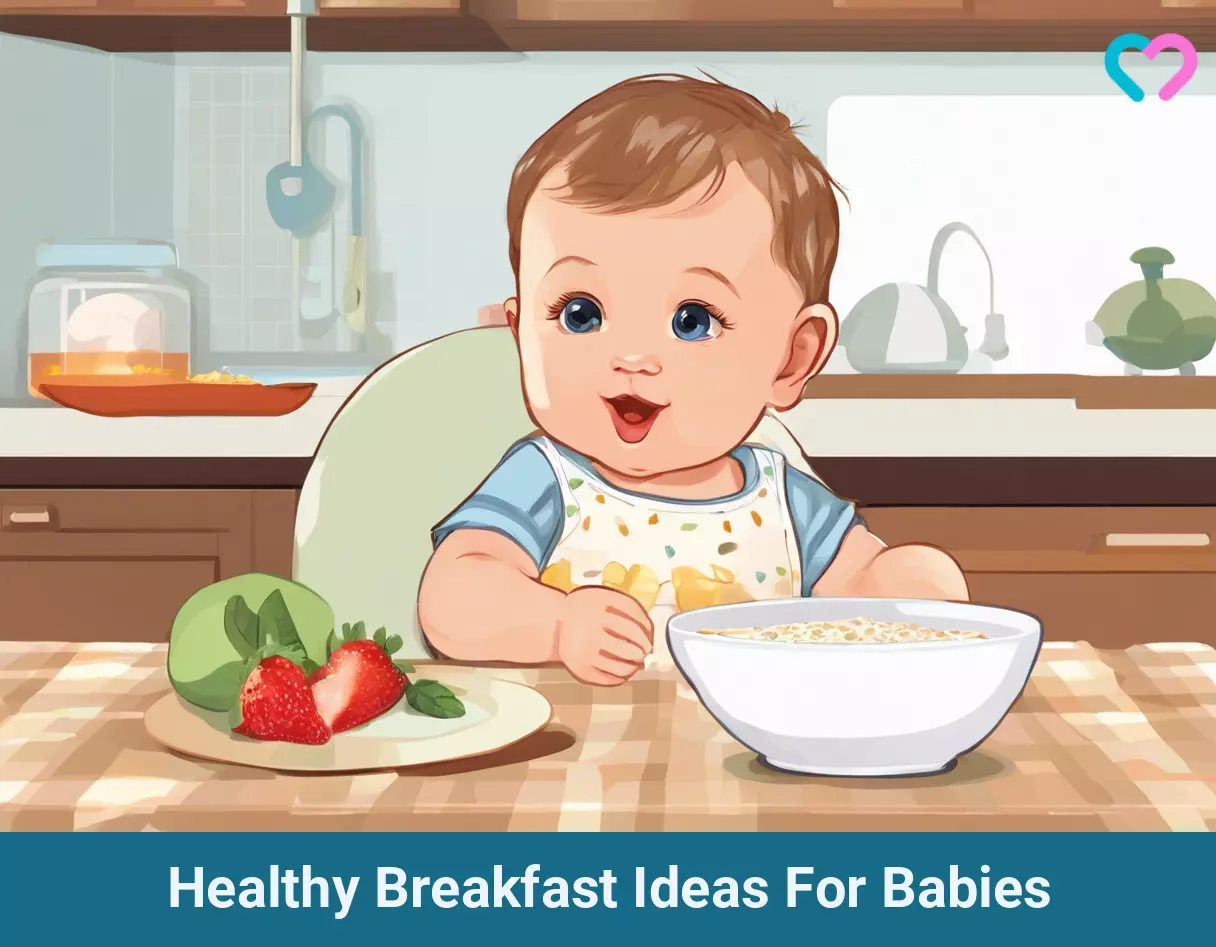
Image: Stable Diffusion/MomJunction Design Team
Start your day off right with these ten quick and easy breakfast recipes for kids! Perfect for 10+ months to two-year-olds, these breakfast ideas are sure to please.
Personal Experience: Source
MomJunction articles include first-hand experiences to provide you with better insights through real-life narratives. Here are the sources of personal accounts referenced in this article.
i. Beginner baby food: 5 first foods for babieshttps://foodlets.wordpress.com/2011/08/01/beginner-baby-food-5-first-foods-for-babies/
References
- Breakfast Basics.
https://kidshealth.org/en/parents/breakfast.html - Breakfast Intake Among Children and Adolescents: United States 2015–2018.
https://www.cdc.gov/nchs/products/databriefs/db386.htm - Making Sure Your Child is Eating Enough.
https://www.healthychildren.org/English/healthy-living/nutrition/Pages/Making-Sure-Your-Child-is-Eating-Enough.aspx - Kirsten A Grimm et al.; (2014); Fruit and Vegetable Intake During Infancy and Early Childhood.
https://pmc.ncbi.nlm.nih.gov/articles/PMC4258845/ - Theresa A Nicklas et al.; (2025); Nutrient intake introduction of baby cereals and other complementary foods in the diets of infants and toddlers from birth to 23 months of age.
https://pmc.ncbi.nlm.nih.gov/articles/PMC7109529/ - Safreena Kabeer et al.; (2025); Formulation of fortified instant weaning food from Musa paradisiaca (banana) and Eleusine coracana.
https://www.frontiersin.org/journals/nutrition/articles/10.3389/fnut.2025.1203955/full - Organic Steel Cut Oats.
https://fdc.nal.usda.gov/food-details/2427101/nutrients - Flour rice white unenriched.
https://fdc.nal.usda.gov/food-details/790214/nutrients - Mangos raw.
https://fdc.nal.usda.gov/food-details/169910/nutrients - Flour barley.
https://fdc.nal.usda.gov/food-details/2512376/nutrients - Lentils pink or red raw.
https://fdc.nal.usda.gov/food-details/174284/nutrients - Pumpkin raw.
https://fdc.nal.usda.gov/food-details/168448/nutrients - Carrots raw.
https://fdc.nal.usda.gov/food-details/170393/nutrients - Rabia Shabir Ahmad et al.; (2018); Nutritional Composition of Meat.
https://www.researchgate.net/publication/328203351_Nutritional_Composition_of_Meat - Apricots raw.
https://fdc.nal.usda.gov/food-details/171697/nutrients - Flour wheat all-purpose unenriched unbleached.
https://fdc.nal.usda.gov/food-details/790018/nutrients - Flour oat whole grain.
https://fdc.nal.usda.gov/food-details/2261421/nutrients - Blueberries raw.
https://fdc.nal.usda.gov/food-details/2346411/nutrients - Babyfood potatoes toddler.
https://fdc.nal.usda.gov/food-details/173508/nutrients - Berries NFS.
https://fdc.nal.usda.gov/food-details/2709271/nutrients - Spinach raw.
https://fdc.nal.usda.gov/food-details/2709614/nutrients - Seeds chia seeds dried.
https://fdc.nal.usda.gov/food-details/170554/nutrients - Yogurt Greek plain whole milk.
https://fdc.nal.usda.gov/food-details/2259794/nutrients - Lactose Intolerance in Infants & Children: Parent FAQs.
https://www.healthychildren.org/English/healthy-living/nutrition/Pages/Lactose-Intolerance-in-Children.aspx - Eating Diet & Nutrition for Lactose Intolerance.
https://www.niddk.nih.gov/health-information/digestive-diseases/lactose-intolerance/eating-diet-nutrition - When should I introduce wheat into my baby’s diet?
https://www.healthychildren.org/English/tips-tools/ask-the-pediatrician/Pages/When-should-I-introduce-wheat-into-my-babys-diet.aspx#:~:text= - AAP Clinical Report Highlights Early Introduction of Peanut-based Foods to Prevent Allergies.
https://www.healthychildren.org/English/news/Pages/Early-Introduction-of-Peanut-based-Foods-to-Prevent-Allergies.aspx - Starting Solid Foods.
https://www.healthychildren.org/English/ages-stages/baby/feeding-nutrition/Pages/Starting-Solid-Foods.aspx - A. Marduel Boulanger and M. Vernet; (2018); Introduction of new food textures during complementary feeding: Observations in France.
https://www.sciencedirect.com/science/article/pii/S0929693X17304700 - 7 tips for winning over a picky eater.
https://www.unicef.org/parenting/food-nutrition/7-tips-winning-over-picky-eater - The importance of breakfast: Start your day off strong.
https://www.chrichmond.org/services/gastroenterology-and-nutrition/feeding/the-importance-of-breakfast - Fresh and Easy: How to Make Pureed Baby Food.
https://extension.usu.edu/nutrition/research/fresh-and-easy-how-to-make-pureed-baby-food - Feeding your baby in the first year: Caring for Kids.
https://caringforkids.cps.ca/handouts/pregnancy-and-babies/feeding_your_baby_in_the_first_year - Your baby’s first solid foods.
https://www.nhs.uk/conditions/baby/weaning-and-feeding/babys-first-solid-foods/ - What age can I give Weetabix or Ready brek to my child?
https://weetabixfoodcompany.co.uk/faqs/what-age-can-i-give-weetabix-or-ready-brek-to-my-child/ - Weaning your baby.
https://www.nidirect.gov.uk/articles/weaning-your-baby
Community Experiences
Join the conversation and become a part of our nurturing community! Share your stories, experiences, and insights to connect with fellow parents.
Read full bio of Laura Lacey
Read full bio of Rohit Garoo
Read full bio of Swati Patwal
Read full bio of Vidya Tadapatri











